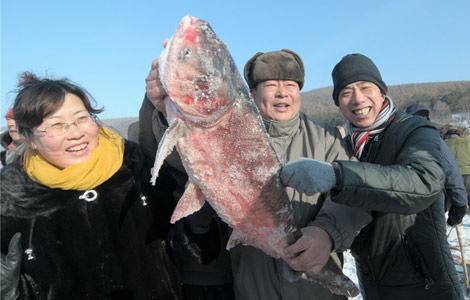In memory of unnamed war heroes
Updated: 2013-12-30 07:14
By Dong Fangyu in Beijing and Liu Ce in Shenyang (China Daily USA)
|
||||||||
Repatriation of the remains of Korean War soldiers will bring attention to the veterans, report Dong Fangyu in Beijing and Liu Ce in Shenyang.
Sixty years after an armistice agreement was signed, the remains of more than 400 Chinese soldiers killed in the Korean War (1950-53) are set to finally head home.
When Republic of Korea's President Park Geun-hye visited China in June, she offered to repatriate 360 sets of remains buried in a cemetery in the city of Paju, but in the intervening months, ROK authorities increased the number to 425. According to the ROK Defense Ministry, excavation work started on Dec 19, and, in addition to the bodies, the remains include seals, pens, badges and uniforms.
Experts said the offer will not only improve Sino-ROK relations but also have a ripple effect stretching far beyond politics, including heightening public awareness about those who fought in what is often seen as a forgotten war.
"The news that the remains will be returned has evoked great emotion in many Chinese people," said Jin Qiangyi, a Korean studies professor at Yanbian University in Jilin province.
Liu Guizhi, an 82-year-old Korean War veteran, was excited. Even though he didn't know any of the soldiers buried in Paju he regards them as his comrades-in-arms. "Finally, they can come home, like falling leaves returning to the roots. It's a great comfort to know that," he said.
Liu, from Shenyang, the capital of Liaoning province, joined the army in 1948. When the war broke out in 1950, he arrived at the front as a 19-year-old artilleryman. The constant roar of the guns left him deaf in the left ear, so he often shouts instead of talking, even when his hearing aid is switched on.
"I often recall the war in Korea because it was really a hard time. I was lucky enough to survive, but countless comrades died in that foreign land. I really hope they can come home and then at least we can all be buried together in China."
During the past two years, Zhang Wei, a public welfare undertaker from Dandong - a city on the Yalu River in Liaoning, which forms China's border with the Democratic People's Republic of Korea - has organized and led at least 10 groups of relatives to pay their respects at the cemetery in Paju.
"When I heard the news, I took the ferry from Dandong to Incheon so I could follow the excavation work on the spot," said Zhang, speaking on the phone from the ROK.
"I am representing my fellow Chinese, those people whose loved ones were killed in action somewhere in the ROK. I went to the cemetery in Paju last week, but it was Christmas Day, which is a public holiday in the ROK, so the excavation teams weren't working," he said. "However, things look to be in good order. Several large tents are pitched at the site, probably as resting places for the workers, and I saw excavation tools, desks and heaters."
'Martyr's Certificates'
Zhang said that according to the "Martyr's Certificates" the Chinese government sent to the families of the war dead, the places the soldiers fell are marked, but the locations of most of the graves are unknown. The names of the dead soldiers in Paju are also unknown.
"The families regard all these martyrs as their 'fathers'. They really hope they can join the process and witness or accompany their 'fathers' on their return journey home,' he said.
Peng Guangqian, a Beijing-based military strategist and a major general in the People's Liberation Army, said China should not simply sit back and wait for the repatriation to happen. Instead, the government should actively cooperate with the ROK and engage in the process.
Because the excavation work - including washing and drying the remains, and then placing them in coffins - is likely to take several months, details about when and where they will be interred have not yet been released. However, some experts have speculated that a war cemetery in Shenyang will house the remains.
As far as Liu is concerned the location is unimportant, what really matters is bringing the bodies back to home soil. "Anywhere is OK, as long as it's in China. The martyrs' cemetery should not just serve as a burial ground, but also as place to witness history, so later generations will never forget."
The Chinese People's Volunteers entered the conflict - known in China as The War to Resist US Aggression and Aid Korea - in October 1950, but it wasn't until 2010 that the death toll among CPV troops was confirmed at 183,108. The details cover both sides of a memorial wall at the Korean War Memorial Museum in Dandong.
The museum has been collecting data on CPV casualties and deaths since the late 1990s. Researchers have traveled to 2,670 counties and districts across all the provinces, regions and municipalities on the Chinese mainland except the Tibet autonomous region, according to Xinhua News Agency.
Xia Wentai, an expert in Korean War studies at the Liaoning Provincial Patriotic Education Base, said that the death toll may be not exact, but it accords with the reality of the situation as viewed by Chinese military historians and veterans.
Virtual graveyard
Xia, 75, participated in the renovation of the museum in Dandong. He has devoted more than 30 years to projects to honor veterans of the war across Liaoning and, despite his advanced years, his enthusiasm remains undimmed. He recently set up a virtual graveyard online to allow people to pay tribute to the soldiers that died.
More than 2.9 million CPV soldiers were involved in the war, according to Xiao Yusheng, an expert in military history at the People's Liberation Army's Academy of Military Science, the News of the Communist Party of China quoted as saying.
According to Xia, only 2 or 3 percent of the volunteers are buried in China. Although many of the dead were interred in official cemeteries in the DPRK, others lie in unmarked graves scattered across the Korean peninsula.

"Most of them were killed in action and buried near the battlefields. Because of transport difficulties and the political restraints at the time, only the bodies of model comrades, officers above regimental level, or well-known heroes were transported back to China. Many respected heroes and cadres are buried in the CPV Martyrs' Cemetery in Shenyang," he said.
China has three biggest cemeteries for those who died in the Korean War - in Shenyang, Dandong and Chibi in Hubei province.
Many of the wounded were transported to Dandong, where approximately 3,000 CPV soldiers are buried. Nearly 1,900 of the bodies have been identified, according to statistics from the cemetery management office.
A committee to supervise the construction of the cemeteries was established in 1954. Using specially allocated funds, it sent construction teams, including engineers, designers, and stonemasons, to the DPRK to build eight cemeteries to house the remains of dead Chinese soldiers. Later, the DPRK built more than 200 tombs, each of which contains several bodies.
Zhang Liangui, an expert in Korean studies at the Party School of the CPC Central Committee, said greater efforts should be made to honor those who died in the war.
"The country has an obligation to honor those soldiers, but the Chinese media have only given limited coverage to the fallen," he said. "It was only when our leaders visited the DPRK and went to the cemeteries for Chinese soldiers, that they suddenly became headline news."
Zhang said that sometimes the commemorations are more about "Sino-DPRK relations", and the country owes a great debt to all the troops, including the veterans and prisoners of war who underwent tremendous suffering.
Portraits and prose
In July, Shi Rongfeng, who graduated from the China Central Academy of Fine Arts in 2011, began interviewing veterans from northeastern China. So far, the 27-year-old has visited 18 former combatants and painted their portraits.
"People usually pay more attention to the War of Resistance against Japanese Aggression (1937-45) than the Korean War. It seems that society is gradually forgetting about the veterans of the Korean War, and that makes them very sad," he said.
He hopes that the repatriation of the remains will attract greater attention to the veterans, because they are "living memorials".
"Visiting those old soldiers is an urgent task, because they are now very old men. If we don't listen to them, their heroic stories will gradually be forgotten with the passage of time," he said.
Shi quit his job in Beijing, and began traveling to meet veterans and collect their stories. He wants to record history with his paintbrush and learn more about the conditions the men endured.
"I was deeply touched by them. Their stories stirred my patriotism. They devoted their lives to serving the country bravely and honorably. Many of their comrades died, but many survived, albeit carrying injuries and disabilities sustained in the fighting. They don't regret the part they played, though - their patriotism is unswerving."
However, Shi's initial excitement has gradually turned to dismay. During his visits to Dandong, Shi asked the local civil affairs bureau, newspapers and communities to provide him with a list of names and addresses of surviving veterans, but his approaches were rebuffed. "They preferred to give the information to an official organization rather than an individual," he said.
In the face of indifference and bureaucracy, he adopted a new approach - every time he visits a veteran he asks for names and addresses of their former colleagues and then visits them.
But the more veterans he visited, the more worried he became. "Most of them are not treated with the respect that should be given to heroes, and their living conditions are not good."
Although many veterans are still troubled by the injuries and disabilities they sustained in combat, their army pensions are so low that they struggle to pay their medical bills. In addition to their war wounds, they also have ailments that commonly afflict the elderly, and those without well-off children are often reduced to poverty.
Shi said he plans to complete his visits to the veterans in six months or so. After that, he'll begin work on a book.
"I will write down all my experiences and thoughts in an album that will also include the soldiers' portraits and stories. I want to encourage people to join me and help draw attention to these forgotten heroes so their lives will be improved and they'll finally gain the respect they deserve."
Contact the authors atdongfangyu@chinadaily.com.cn and liuce@chinadaily.com.cn
|
Primary school pupils pay their respects to the war dead at the Chinese People's Volunteers Martyrs' Cemetery in Shenyang, the capital of Liaoning province. Liu Haiyang / for China Daily |
|
The cemetery for the Chinese People's Volunteer troops in the city of Paju in the Republic of Korea. Zhang Wei / for China Daily |
|
The Chinese People's Volunteers Martyrs' Cemetery in Dandong is one of three biggest resting places in the country. Xia Wentai / for China Daily |

(China Daily USA 12/30/2013 page7)
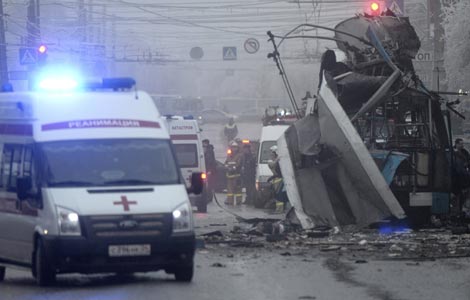
 Second blast kills 10 in Russian city
Second blast kills 10 in Russian city
 F1 legend Schumacher in coma after ski accident
F1 legend Schumacher in coma after ski accident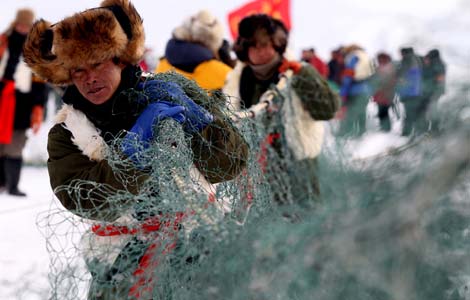
 Net result
Net result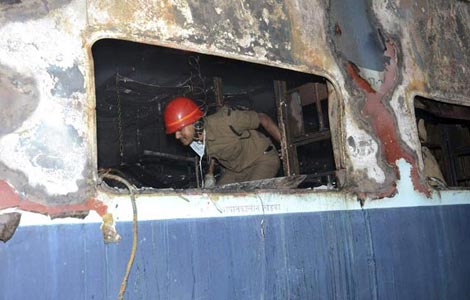
 Fire on express train in India kills at least 26
Fire on express train in India kills at least 26
 Times Square visitors purge bad memories
Times Square visitors purge bad memories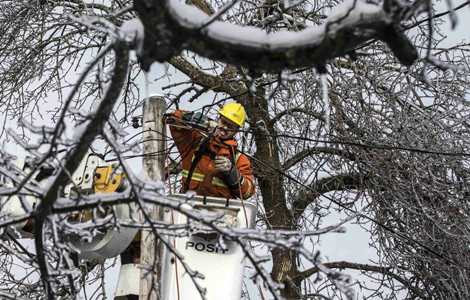
 Ice storm leaves many without power in US, Canada
Ice storm leaves many without power in US, Canada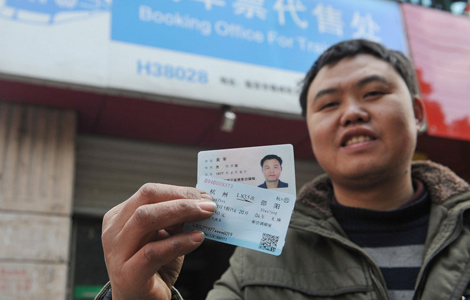
 'Chunyun' train tickets up for sale
'Chunyun' train tickets up for sale
 Abe's war shrine visit sparks protest
Abe's war shrine visit sparks protest
Most Viewed
Editor's Picks

|

|

|

|

|

|
Today's Top News
Outrage still festers over Abe shrine visit
Suicide bomber kills 16 at Russian train station
Magazine reveals NSA hacking tactics
Pentagon chief concerned over Egypt
Broader auto future for China, US
Li says economy stable in 2014
Bigger role considered in the Arctic
3rd high-level official probed
US Weekly

|

|





